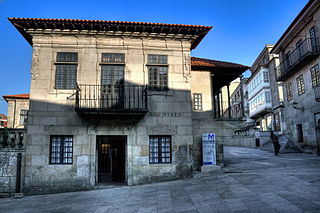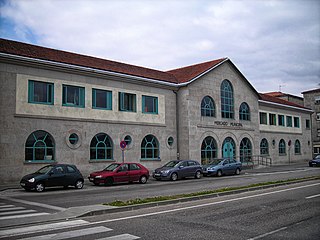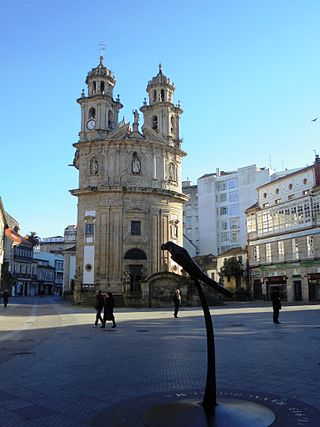
The Valle-Inclán High School is a large eclectic and Art Nouveau building located in the city centre of Pontevedra, Spain. It is named after the writer Valle-Inclán who studied and lived in Pontevedra. Today it is the seat of the Valle-Inclán Secondary School and was the first and the only secondary school in the province of Pontevedra from 1845 to 1927.

The Pontevedra City Hall in Pontevedra, Spain, is the seat of the city council of this Galician city. It is located at the eastern end of the Alameda de Pontevedra, on the edge of the old town. To the west it opens onto the pedestrian España Square.

The Casa de las Campanas is one of the three oldest buildings in the city of Pontevedra in Spain, and perhaps the oldest civil building. It is located in Don Filiberto street, at number 11, in the old town.

The Praza da Ferrería is a large square located on the edge of the old town of Pontevedra (Spain), inside the old city walls. It is the main square of the old town and has an area of about 2,000 m2. It includes the small squares of the Estrella on the north side, the Orense square on the south side and the Casto Sampedro square on the east side, making a total of almost 5,000 m2.

The Café Moderno is an art nouveau and eclectic building located in St. Joseph's Square in Pontevedra, Spain. It is the building with the most important Art Nouveau interior in the city. It is currently the headquarters of one of the socio-cultural centres of Pontevedra Afundación, owned by the Abanca bank.

The Post and Telecommunications Palace of Pontevedra is a building between Oliva and García Camba streets, in the heart of the commercial and financial centre of Pontevedra, Spain. Since its construction, it has been the main headquarters of Correos in the city and in the province of Pontevedra. In front of its main façade there is an olive tree which gave its name to the Olive Street.

The Pazo de Castro Monteagudo, is an 18th-century baroque pazo in Pasantería Street, next to the Plaza de la Leña in the city of Pontevedra, Spain, in the heart of the old town.

The Bank of Spain building is an eclectic early-20th-century building in the Spanish city of Pontevedra.

The Central Market of Pontevedra is a covered market located in Pontevedra, Spain. It is located at the north-eastern edge of the historic centre, close to the Burgo Bridge. It overlooks the banks of the Lérez river and was inaugurated in 1948.

The Administrative building of the Xunta de Galicia in Pontevedra is an office complex designed to house the various public services of the Galician Government in Pontevedra, Spain. The building houses many of the Galician administration's departments and was designed by the architects Manuel Gallego Jorreto and Jacobo Rodríguez-Losada Allende.

The Plaza de la Peregrina is an 18th-century square located in the city centre of Pontevedra (Spain), on the edge of the historic centre.

The Pontevedra Bus Station is a bus station in Pontevedra (Spain) that allows inter-city bus traffic, with national or international destinations.

The Pontevedra Provincial Hospital is a building dating from 1897, located in the city centre of Pontevedra, Spain.

Curros Enríquez Square is a square of medieval origin located in the heart of the historic centre of Pontevedra (Spain), on the Portuguese pilgrimage way.

The Marquis of Riestra's mansion is an eclectic building with art Nouveau elements from the late 19th century located at 30 Michelena Street in Pontevedra, Spain. It currently houses the main central administrative services of the City Council of Pontevedra.

The former Saint Ferdinand Barracks in Pontevedra, is a large neoclassical building from the beginning of the 20th century located in the centre of Pontevedra (Spain), opposite the Doctor Marescot Gardens and very close to the Alameda de Pontevedra.

The calle Benito Corbal is a street in Pontevedra (Spain) located in the first urban expansion area of the city. It is one of the main streets of Pontevedra, known as the "Golden Mile".

The Gran Vía de Montero Ríos is an avenue in Pontevedra (Spain) located in the city centre, in the 19th century bourgeois area. It is one of the most emblematic avenues in Pontevedra.

The Calle Daniel de la Sota is a central street in the Spanish city of Pontevedra, located in the city's first expansion area. It is one of the best-known streets in Pontevedra.

The Ensanche of Pontevedra is the neighbourhood that forms the centre of the Spanish city of Pontevedra, made up of several successive extensions to the city outside the old town. The term Ensanche means " widening " in Spanish and refers to the expanding areas of Spanish cities towards the end of the 19th century, when the demographic explosion and the industrial revolution led to the demolition of the old city walls and the construction of new areas outside the old fortified walls.




























